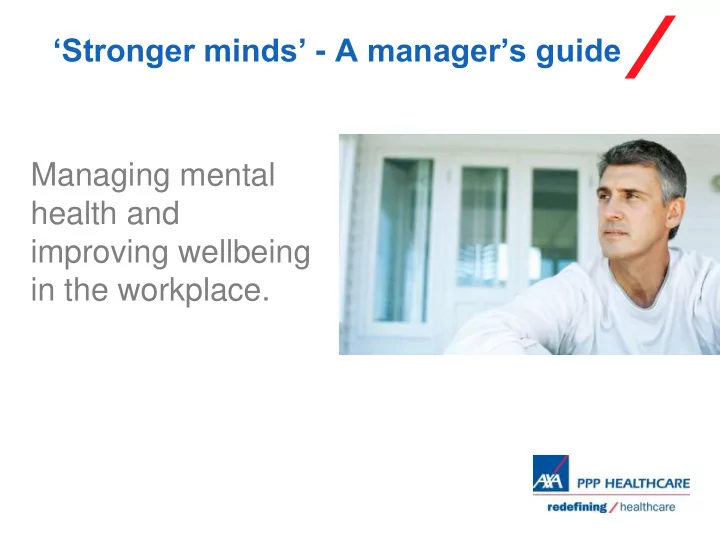

‘Stronger minds’ - A manager’s guide Managing mental health and improving wellbeing in the workplace.
What we’ll cover today 01 02 03 Understand pressure Identify your triggers Discover ways to and stress and learn practical build resilience for steps to lessen the the future impact
The truth about mental health Mental health issues are more common than you might think… 70% 1 in 4 1 in 6 1 in 10 Of people right Young people with 1 in 4 people will now are experience a experience a mental experiencing mental health health problem in any anxiety, problem given year depression or unmanageable stress
The truth about mental health Mental health issues are more common than you might think… 70% 14 1 in 4 1 in 10 The average number Women will require Men will require of hours a week a treatment for treatment for person spends depression depression worrying
The statistics
The statistics Depression 2.6% Anxiety 4.7 % Mixed anxiety and depression 9.7% Phobias 2.6% OCD 1.3 % Panic disorder 1.2 % Post traumatic stress disorder 3.0 % Eating disorders 1.6 %
Pressure or stress? ‘Stress occurs when the perceived demands placed upon an individual exceed their perceived ability to cope.’
Pressure or stress? Peak performance P e r f o r m Rust Out Burn Out a n c Underload Challenge Overload e Demands or pressure
Common factors that you might define as stressful External influences: Internal influences: Pressure to meet tight deadlines Setting standards too high Feeling harassed Trying to please everyone Challenging relationships Being afraid to say no Peer pressure Never being satisfied with our efforts Financial worries Running around like there is no Your commute to work! tomorrow Work life balance Personality characteristics
Identify your triggers
Signs and symptoms 05 01 03 Flight/fight Thinking Mood and response patterns emotions 02 04 Physical Behaviours changes
Thinking patterns and stress On being asked to deliver a presentation… Negative Thoughts Negative Feelings “I’m hopeless at giving Anxiety, Worry, helplessness presentations ” “It will go badly” Negative Outcome Negative Behaviour Fails to overcome nerves, Loss of confidence, over- presentation is poor prepares, advanced apology
Signs and symptoms 04 03 02 Physical Mood and Behaviours changes emotions
The fight or flight response A situation occurs that is perceived as a threat by individual Stress hormones released to enable individual to respond Fight/Flight response activated Threat removed or avoided Stress hormones de-activated and body returns to normal state
Managing pressure and stress Effective stress management involves: Stress prevention Stress recovery 02 03 01 Building Mindfulness Sleep resilience
Building resilience Identify priorities Recognise Ask for help mistakes and delegate are part of life Take e Know and take menta tal health th Notice advantage of emotional seriousl ously personal barometer strengths Accept that the Realistic profession is goals inherently stressful Seek life balance
Building resilience Common traits of resilient people Seek eek help when en Self lf-esteem steem Optimist mistic ic Soc ocial ial they need ed it
Building resilience A ccept it. B uild C hange Managing (if you can’t your pressure your alter resilience, ABC’s perceptions or avoid it)
Mindfulness Mindfulness cultivates the ability to disengage from incapacitating worry and detrimental or self-defeating negative thinking, increasing the capacity for present moment awareness through simple breathing and meditation practices.
Mindfulness Mindfulness • Intention • Attitude • • Awareness Attention • In the present moment Mindfulness • With acceptance Social competence • Self regulation • Emotional, cognitive, behavioural flexibility • Values clarification • Exposure
Mindfulness Increases brain Improves Improves Calms and Boosts activity in learning, medical conditions psych decreasing cortisol immune – type 2 diabetes, memory, emotional functioning (stress hormone) system reasoning centres pain, asthma • NICE recommended treatment for depression
Sleep 76% EAP callers who describe often having poor sleep Sleep is essential to good mental wellness Sleep coaching Lower your expectations of sleep Keep a sleep diary
Sleep hygiene • Sleep is essential to good mental wellness • Relax • Avoid Stimulants • Reduce Alcohol • Calm Environment • Keep Routine • Reinforce Connection between bed and sleep • Exercise • Leave your troubles • Don’t lie there • Keep a sleep diary
Use the support available to you Visit the Mindbuilding toolkit www.axappphealthcare.co.uk/mindbuilding
Use the support available to you Employee Assistance Programme Practical Personal support Health information Call. information and and guidance through Health at Any time. options through through Hand services Whatever the LifeManagement counselling reason. ™ services services 0800 072 7 072 25
Use the support available to you Your Management Consultancy Service • How to encourage an employee to call the employee support service • Tackling a performance issue • Delivering bad news • Addressing an absence issue • Coping with change, such as a merger or team restructure • Dealing with harassment or discrimination Call. Any time. Whatever the reason. 0800 072 7 072
Use the support available to you Employee Assistance Programme – Talking to us • You can call us as often as you need to, 24 hours a day, seven days a week • All calls are confidential • Calls are answered by our fully Call. Any time. qualified teams Whatever the reason. 0800 072 7 072 27
Thank you Any questions?
Recommend
More recommend